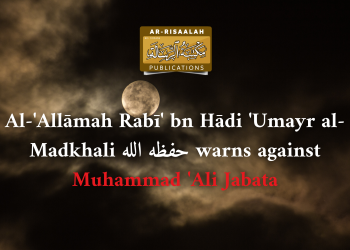Shaykh Yaḥyá An-Nahārī
Wa ʿalaykum as-Salām wa raḥmatullāh wa barakātuh. May Allāh elongate your life. May Allāh elongate your life, Shaykh Nāṣir. I hope you are fine and well.
Regarding the speech of this man called ʿImrān bn Abdil-Majīd, that it is permissible to criticize the rulers publicly on the pulpit, indeed, this is a false speech. And it is not permissible.
And he used as proof, as you mentioned, a statement ascribed to Abū Bakr, “Obey me as long as I obey Allāh regarding you. And when I do wrong, correct me.”
Firstly, he said it is from Abū Bakr, there are those who say it is from ʿUmar.
Likewise, this narration is not authentic. And if it is authentic, and if it is authentic, then it is not to be acted upon because it opposes the proofs.
And the Companions, may Allāh be pleased with them, obey the Messenger ﷺ. The do not disobey him, may he be extolled and granted peace.
And he is the one who commanded with listening and obeying the ruler. He said: “Upon you is listening and obeying, even if an Ethiopian slave becomes a leader over you.”
Likewise, it opposes the methodology of advising the rulers. The Prophet ﷺ said: “Whoever sees what he dislikes from his leader should meet him in private and then, inform him. If he accepts [the advice] from him, that is good. If he does not accept it, he has fulfilled his duty.”
And he, may he be extolled and granted peace, said: “Ask Allāh, the Mighty and Majestic, for what belongs to you.”
So, this is what is compulsory when dealing with the errors of the ruler. Advising should be in private. As for him publicizing the advice, this is not the methodology of the Muslims. Rather, this is the methodology of the Khawārij. Revolting against the rulers. [The Khawārij] whom the Prophet ﷺ warned us against.
“If I were to meet them, I would kill them with the killing of ʿĀd and Thamūd [i.e., totally].” He also said: “They are the worst of those killed beneath the canopy of the sky.”
This is the appropriate methodology with respect to dealing with the ruler in terms of advising.
And the Prophet ﷺ said: “The religion is Naṣīḥah (sincerity of purpose).” We [i.e., the Companions] said: “To whom?” He replied: “To Allāh, His Messenger, His Book, and the leaders of the Muslims.”
He gives them sincere advise. He gives the leaders of the Muslims sincere advise and the advice should be in private and not public.
And even him [i.e., ʿImrān], does he accept public advice? No one accepts it. As Ash-Shāfiʿī said: “Advise whenever I’m alone… For, advising in the midst of people is scolding and I am pleased with listening to it.”
Yes. Advising publicly is scolding. There is no one who is pleased with being advised publicly. What of the ruler then? The one who has the right to listening and obedience.
Likewise, what stems from advising publicly? What stems from it is inciting the general people against the ruler. And the effects of that manifest by revolting against the ruler. And [spilling of] blood and killing stem from that. All this is due to that. So, this speech of his is falsehood.
And as for what this individual who possesses a method of the Khawārij says, that issuing verdicts to the people regarding not protesting is a Madkhalī, Jāmī verdict, this is in support of the doctrine of the Khawārij.
Who is pleased with protests and revolt? Are they from the religion of Islām? Did the Prophet ﷺ come with them? Did the Companions, may Allāh be pleased with them, come with them? No, by Allāh!
Then, he says that the two noble Shaykhs, issued this verdict as agents of the King of Saudi.
My brother, even if they issued this, it is compulsory to obey those in authority.
﴾O you who believe! Obey Allah and obey the Messenger (Muhammad ﷺ), and those of you (Muslims) who are in authority.﴿ [An-Nisāʾ: 59]
Likewise, they—it seems as if he mentioned Shaykh Rabīʿ and Shaykh Muḥammad Amān Al-Jāmī—issued the verdict regarding the impermissiblity of protests due to what they cause of evil effects and what they cause of lack of security and safety, till even the religion will not be established.
Likewise, the based their verdict regarding the impermissiblity of protests upon the Book of Allāh and the Sunnah of the Messenger ﷺ.
And Allāh says [what means]: ﴾And hold fast, all of you together, to the Rope of Allah (i.e. this Quran), and be not divided among yourselves﴿ [Āl ʿImrān: 103]
And protests are a division of the unity of the Muslims.
So, is there anyone from the Muslims who permits the division of the unity of the Muslims? And what causes the division of the unity of the Muslims? This.
Likewise, among the proofs for listening and obeying the rulers, it came in the ḥadīth of Ḥudhayfah, may Allāh be pleased with him, when he used to ask [the Prophet ﷺ], till he [i.e., the Prophet ﷺ] said: “Some people will come who will be selfish,” with wealth—as the people of knowledge explained it. So, he [i.e., one of those present] said: “Should we not overthrow him?” So, he [i.e., the Prophet ﷺ] said: “No, as long as they observe the Ṣalāh amidst you. No, as long as they observe the Ṣalāh amidst you.”
I ask Allāh to grant me and you success and guidance. And may Allāh extol and grant peace to our prophet, Muḥammad, his household, and all his Companions. Wa as-Salām ʿalaykum wa raḥmatullāh wa barakātuh.
Shaykh ‘Abbās Al-Jawnah
As-salamu alaykum Wa rahmatuLLAAH wa barakaatuH.
I say, this brother that ascribes this statement to Abu Bakr, that he said: “follow me, as long as I obey ALLAAH over you. If I disobey ALLAAH, then unseat me.”
One of the listeners said: “We willl unseat you with our tongues, otherwise, we’ll use our swords”
Firstly, he ascribed this to Abu Bakr and it is not from Abu Bakr but from Umar.
Also, this statement that is from reported from Umar, there are some comments (of the scholars) on the (inauthenticity of the) statement.
Thirdly, there is Nakaarah (contradiction to authentic or more authentic reports) in the statement, how is this kind of affair going to happen from a companion and thus making someone speaking up to Umar with these wordings?
Fourthly, the Sunnah of The Prophet ﷺ prohibits this. We have here a statement of Umar and this incident that happened around him, despite the fact that there are reports from The Prophet of ALLAAH ﷺ commanding patience with the people of authority, even when they oppress or they aggrieve.
Then how does he want to deal with the ahaadeeth that are direct texts – in the view of the people of Sunnah – prohibiting revolting against the leader if he’s unjust or oppressive, the ahaadeeth are prohibiting and these ahaadeeth are numerous. From them is “as long as they observe Salah”, when the Prophet ﷺ told them “there would be among you leaders who delay Salah” and he mentioned things about them and he was asked: should we revolt against them O Messanger of ALLAAH ﷺ? No, as long as they observe Salah”. (Sahih Ibn Hibbaan, with slightly different wordings)
This narration of Umar that this person used as evidence to make permissible speaking against the leaders on the pulpits, whereby he uses this narration as punchline, no one from Ahlus-Sunnah Wal-Jama’ah said it, rather it has in it traits from the traits of the Khawaarij (the revolutionarists), as we have said initially, firstly; the statement is not from Abu Bakr but from Umar, also (secondly) there are comments on the (authenticity of the) narration, thirdly; there’s nakaarah on the narration because it contradicts the ahaadeeth of the Messenger of ALLAAH ﷺ on excercising patience with the leaders even if they are oppressive or unjust, this man has traits of the Khawaarij (the revolutionarists) and what is the crime of Ahlus-Sunnah that he (oppressively) called Madaakhilah except that they have said the truth? Why do they ascribe these things to them? They say: the Madaakhilah said so so, the Madaakhilah said so so, whereas what they said is “The Messenger of ALLAAH said”. The one who prohibited this affair is The Messenger of ALLAAH ﷺ. But as for those they named Madaakhilah, by ALLAAH, they do not put any statements above that of ALLAAH and HIS Messenger ﷺ, irrespective of whoever’s speech it is. As for this man, subhanallaah, has combined in him ignorance, bigotry and reviling the innocents and leaving off the Manhaj of the People of Sunnah. No one has said his statement except the Khawaarij (ISIS, Boko Haram, Al-Qaedah etc) then he should be glad with him (preceding him on his misguiding statement). As for the People of Sunnah, all of them, from the time of the Prophet ﷺ and the time of the Tabi’uun down to this time of these scholars; Shaykh Al-Albaani, Shaykh Ibn Baaz, Shaykh Muqbil, Shaykh Ibn ‘Uthaymeen, they did not say this statement, they did not say this statement.
…
..
Unclear..
Except what is from (Sayyid) Qutb or (Hasan) Al-Bannaa and those on their path; those who incite the masses, the students of knowledge and callers against their leaders. These are people of revolutions, people of uproar, people of violence and other things that happen from them, as The Prophet informed about them in more than one hadeeth.







